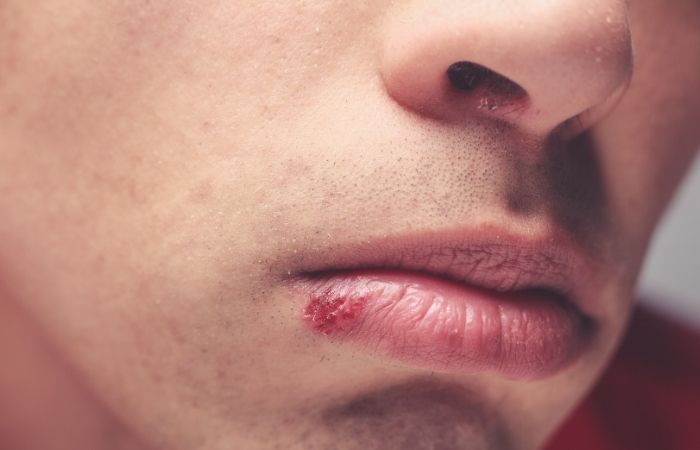Quick Answer: Sharing drinks, vape pens, or personal items like razors and towels at parties can transmit viruses like herpes, hepatitis B, and mononucleosis, even without sex. The risk is low, but not zero, especially if someone has visible sores or broken skin.
This Isn’t Just About Making Out
We tend to think of STDs as something you get through intercourse, or at least some sort of steamy make-out session. But the reality is more complicated. Some viral infections, especially ones that affect the mouth and throat, can spread through casual, non-sexual contact. This includes things like:
- Sharing drinks or water bottles at parties or festivals
- Passing around a vape pen or joint
- Using someone else’s lip balm or makeup
- Drying off with a shared towel at a pool or after a hookup
- Shaving with a borrowed razor (yes, it happens more than you think)
While most of these actions don’t guarantee infection, they open small windows of opportunity, especially for viruses like HSV-1 (oral herpes), hepatitis B, and EBV (the virus behind mono).

People are also reading: The Syphilis Surge No One Saw Coming
“I Didn’t Even Hook Up. I Still Got Herpes.”
Maya, 22, thought she was being careful. “I was the only sober one at the party,” she said. “But I used someone else’s vape, just once, and five days later, I had a cold sore. I’d never had one before. My doctor told me it was herpes. I was in shock.”
“I kept thinking, this isn’t how it’s supposed to happen. I didn’t even kiss anyone.”
Stories like Maya’s are increasingly common. They’re not meant to scare you, they’re meant to spotlight the blind spots in how we talk about risk. Because when we say “safe,” what do we really mean?
When you’re swapping saliva through straws or vape pens, the chances of picking up an infection are still relatively low, but they’re not zero. And if someone at that party has an active cold sore? That risk goes way up.
Saliva Isn’t Sterile, But It’s Complicated
Here’s where things get a little murky. Saliva actually contains enzymes that help fight off viruses and bacteria. That’s why the risk of getting a full-blown STD from sharing a drink or vape is technically low. But low risk isn’t the same as no risk, especially when it comes to viral infections that don’t need much to spread.
Herpes Simplex Virus Type 1 (HSV-1) is the big one here. It’s carried by over 50% of the population, and many people don’t know they have it. It’s usually spread through kissing or oral sex, but also through things like:
- Shared utensils
- Chapstick or lip gloss
- Drinkware like cans, bottles, or cups
If someone has an active sore or is in a shedding phase (when the virus is present on the skin but not visible), it’s possible to transmit HSV-1 through shared saliva-contact items.
It’s not just herpes, either. Shared party items can also increase exposure to:
- Epstein-Barr Virus (EBV): Causes mono and spreads easily through saliva
- Hepatitis B: Can live on surfaces like razors or toothbrushes for up to 7 days
- Human Papillomavirus (HPV): Rarely oral-to-oral, but still possible in high-risk cases
The bottom line: saliva isn’t a sterile substance. And if it’s being passed around at a party, especially in high-turnover items like vapes or shared drinks, you’re playing the odds.
Why Party Environments Supercharge Risk
In the quiet of daylight, no one would willingly pass around a bloodied razor or share a soda with a stranger. But parties do something to people. The combination of music, dim lights, alcohol, and peer pressure creates a kind of social amnesia about hygiene and boundaries. Suddenly, passing the vape isn’t just acceptable, it’s expected.
Let’s look at what happens in a typical high-energy party environment:
- Judgment drops: Alcohol and substances lower your internal alarms about hygiene and risk.
- Boundaries blur: It feels rude to say no when someone hands you something to share.
- Risk becomes invisible: No one looks sick, so you assume it’s fine.
And if you’re part of a group or scene where “sharing everything” is part of the vibe? The pressure to go along can override your gut instincts, especially when everyone else seems fine.
What we’re talking about isn’t paranoia. It’s body autonomy. Knowing when and how to protect yourself, even in the smallest ways, can mean avoiding weeks of discomfort or lifelong infections.
Check Your STD Status in Minutes
Test at Home with Remedium7-in-1 STD Test Kit

 For Men & Women
For Men & Women Results in Minutes
Results in Minutes No Lab Needed
No Lab Needed Private & Discreet
Private & DiscreetOrder Now $129.00 $343.00
For all 7 tests
“Everyone Was Doing It” Is Not a Medical Defense
Social norms are powerful. If 10 people are passing around the same vape or cocktail, it feels weird to be the one who says “Nah, I’ll pass.” But you don’t owe anyone access to your mouth, or your immune system.
Think about how party culture operates: it celebrates unity, intimacy, and bonding. But bonding doesn’t need to mean shared bodily fluids. You can still be fun, sexy, and connected without putting your health on the line.
The people who seem most confident in saying no? They usually had to learn the hard way. You don’t need to wait for your wake-up moment.
The STD Might Show Up Weeks Later
Let’s talk incubation periods. The gap between exposure and symptoms can confuse even the most cautious partygoers. Here’s what you need to know:
- Herpes (HSV-1): 2–12 days after exposure
- Oral gonorrhea: Usually 7–10 days, but often no symptoms
- Mono (EBV): 4–6 weeks post-exposure
- Strep throat: 2–5 days
This delay is why so many people misattribute symptoms to something else, or don’t connect them to a party at all. Just because you feel fine now doesn’t mean you’re in the clear.
Queer, Poly, or Party-Curious? The Rules Still Apply
If you’re part of a queer or poly community where sharing is encouraged and intimacy is fluid, you might already navigate risk more thoughtfully. But shared items still deserve scrutiny, regardless of identity or vibe.
Protecting yourself isn’t about being antisocial or prude, it’s about being informed. And in queer spaces especially, informed consent and body autonomy are sacred. Apply that to shared objects too.

People are also reading: I Couldn’t Get a Test for 8 Months: COVID Delayed My STD Diagnosis
Should You Get Tested If You’re Not Sure?
Yes. If you’re googling symptoms or second-guessing a moment, that’s your intuition talking. You don’t need to justify it to anyone. Testing is about clarity, not confession.
Get peace of mind with a discreet Combo STD Test Kit, available online with fast results.
“But I Thought It Was Just a Cold Sore”
Let’s clear this up: a cold sore is herpes. Specifically, it’s usually caused by HSV-1. And while society has normalized it with cute names like “fever blister,” it’s still a contagious virus that can be passed through shared items, especially when the sore is visible, but even sometimes when it’s not.
Don’t shame yourself if you didn’t know. The misinformation around what herpes actually is, and how it spreads, is thick. What matters now is knowing how to spot it, prevent it, and handle it with truth instead of stigma.
The Mouth Isn’t a Safe Zone
Many people think that oral contact is somehow “cleaner” or less risky than genital contact. That’s not true. Infections like gonorrhea, chlamydia, and syphilis can live in the mouth and throat, often with zero symptoms.
That means someone can look totally healthy, feel totally fine, and still pass something on via a shared vape, a deep kiss, or oral sex. That’s why regular testing matters, even if you haven’t had “traditional” sex lately.
Check Your STD Status in Minutes
Test at Home with Remedium7-in-1 STD Test Kit

 For Men & Women
For Men & Women Results in Minutes
Results in Minutes No Lab Needed
No Lab Needed Private & Discreet
Private & DiscreetOrder Now $129.00 $343.00
For all 7 tests
When You Want to Say No, But Can’t
Let’s acknowledge something deeper: saying “no” at a party isn’t always easy. Maybe you’re new to the group. Maybe you don’t want to look paranoid. Maybe the person handing you the drink is someone you’re into.
This is where scripts help. A simple, “I’m just getting over something” or “I’m on antibiotics” gives you a no-fuss excuse that people won’t question. You don’t owe anyone your health to avoid awkwardness.
What If You’ve Already Shared Something?
First: breathe. The odds are still in your favor. Even if you shared something risky, that doesn’t guarantee infection. But if you feel symptoms, or just want peace of mind, you can act now.
Watch for signs like:
- Tingling or burning on the lips
- Unusual sore throat or swollen lymph nodes
- Painful bumps or blisters around the mouth
- Fatigue or fever a few days or weeks after exposure
Even without symptoms, testing helps you protect others and yourself. Don’t wait until you’re scared, get ahead of it.

People are also reading: Misdiagnosed and Ignored: How Medical Gaslighting Delays STD Treatment
FAQs
1. Can you get an STD from sharing a vape?
It’s rare, but oral herpes (HSV-1) can theoretically be transmitted through shared vapes, especially if someone has an active sore or is shedding the virus.
2. Is sharing drinks really that risky?
The risk is low, but if someone has an active oral infection like a cold sore, mono, or strep throat, sharing drinks can expose you.
3. What if I shared a vape at a party and now I have a sore throat?
A sore throat could be from many causes, including viral infections like mono or gonorrhea of the throat. If symptoms persist, testing is recommended.
4. Can herpes live on my dishes?
Yes, herpes can live in almost any surface.
5. How long after exposure would symptoms show up?
It varies. Herpes can take 2–12 days, mono about 4–6 weeks, and gonorrhea or chlamydia of the throat usually within 7–14 days.
6. Is an STD the cause of cold sores?
Herpes-1 causes cold sores, and it's not always sexually transmitted.
7. Can I get an STD without kissing or sex?
Yes.Skin-to-skin or salivary contact can spread certain infections, particularly hepatitis B, herpes, and mono.
8. What is the most worry-free and secure way to have a party?
Saying no and still having a good time is acceptable.
9. Should I get tested if I feel fine?
If you shared risky items and feel unsure, or are having new partners, yes. Many infections don’t cause immediate symptoms.
10. What’s the best test to take after a party scare?
A throat swab for oral STIs, a herpes test if sores appear, and a full panel combo STD test if you’re sexually active are all smart options.
You Deserve Answers, Not Assumptions
STDs aren’t just a consequence of sex, they’re part of a much wider reality that includes shared items, casual contact, and the small risks we normalize at parties. But knowledge is power, and there’s nothing sexier than someone who takes care of themselves.
Worried about something you shared, or didn’t share, last night? You’re not overthinking it. You’re being smart.
Don’t stay in the dark. Order an at-home STD Combo Test Kit now and take back control on your terms, fast, discreet, and doctor-trusted.
Sources
1. You Probably Won’t Get Herpes from Sharing Someone’s Drink – VICE
2. Can You Get Any STDs Through Clothing? – MedicineNet
3. Can Oral Chlamydia or Gonorrhea Spread Through a Shared Drink? – JustAnswer
4. STD Risks from Shared Razors, Towels, and More – Hope Across the Globe
5. Investigating the survival of herpes simplex virus on toothbrushes and surrogate devices










